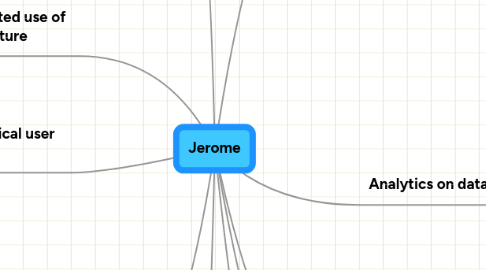
1. Attractive, documented, supported APIs
1.1. Bibliographic APIs
1.1.1. Any item, search result or browse view is available. (append URL with .format)
1.1.1.1. XML
1.1.1.1.1. RSS
1.1.1.1.2. Full "native" XML
1.1.1.1.3. RDF
1.1.1.2. JSON
1.1.1.3. BibTeX
1.1.1.4. XBEL
1.1.1.5. csv
1.1.1.6. MARC
1.1.1.7. RIS
1.1.1.8. Text citation
1.1.1.9. !!! Sort out format vs delivery!!!
1.1.2. "New additions" API
1.1.2.1. "First noticed" field?
1.1.2.2. Visualisations
1.1.2.3. RSS
1.2. Item APIs
1.2.1. JSON
1.2.2. RDF
1.2.3. RSS?
1.2.4. Enrich Horizon content with Nucleus/external? data
1.3. User APIs (out of scope)
2. A semantic sitemap of aggregated data
2.1. Find out what Joss meant by this.
3. Documented technical user case studies
3.1. Write developer case studies - what form should these take?
4. Documented use of infrastructure
5. Contributions to community events
5.1. JISC Infrastructure for Resource Delivery meeting, 1 March, Birmingham
5.2. Mashed Library, 8 March, Lincoln
5.3. Personalised Library Services, 22 March, Cambridge
5.4. cpd25 mashups workshop, 13 April, London
5.5. Opening Data, Opening Doors, 18 April, Manchester
5.6. UC&R Yorks & Humberside event: Discovering Discovery Tools, 16 May, Huddersfield
5.7. Discovery - building a UK metadata ecology, 26 May, London
5.8. Cambridge hack event???????????????????????
6. Analytics on data use
6.1. G Analytics
6.1.1. Site search - how do search terms lead to content? Paths.
6.2. API logs
6.3. Using external analytics to teach jerome?
6.3.1. MOSAIC
6.3.2. circ_tran
6.3.2.1. Can we compare J searches to subsequent checkouts?
6.3.3. G Analytics on HiP etc
6.4. Social media - embedding
7. Openly licensed, bibliographic data
7.1. MARC records
7.1.1. COMET: Identify ownership.
7.1.1.1. Records with no ownership problems
7.1.1.1.1. MARCXML
7.1.1.2. Look at Cambridge tool for identifying.
7.1.2. We need a meeting with the cataloguers!
7.2. IMPORTANT: Jerome can link to the original (HiP display, EPrints) but will serve up its own "new original".
7.3. EPrints data
7.3.1. "Download this record"
7.3.2. Create list to download
7.3.3. Download all?
7.3.4. Records with third-party ownership problems
7.3.5. Licence: "The metadata may be re-used in any medium without prior permission for not-for-profit purposes and re-sold commercially provided the OAI Identifier or a link to the original metadata record are given." --- where's the comma? CC-BY? CC0?
7.3.5.1. Would the university insist on attribution? Ask Ian.
7.3.6. What format is the original data in? EP3 Dublin Core XML
7.4. A-to-Z knowledgebase
7.4.1. No. EBSCO own the data.
7.4.2. Include LoC headings
7.4.3. Provide attribution to EBSCO
7.5. Journal TOCs
7.5.1. No. Using them under CC-BY licence. Check! Ask HW about their CC-BY licence. Internal usage only?
7.5.1.1. Can we harvest?
7.5.1.2. Can we distribute under CC-BY
7.5.1.3. Does the CC-BY cover the API, or the source data?
7.5.1.4. What about commercial interests?
7.5.1.5. Ask JISC OBD
7.5.2. Rely on notice and takedown?
8. A sustainable public-facing search portal
8.1. "Send to..."
8.1.1. RefWorks
8.1.2. Social media
8.1.3. Kindle?
8.2. Record enrichment
8.3. Lists
8.4. Logging in
8.5. Recommendation engines
8.5.1. Weighting. Look at Dave P's stuff
8.6. Mixing desk
8.7. Machine-readable
8.7.1. COinS
